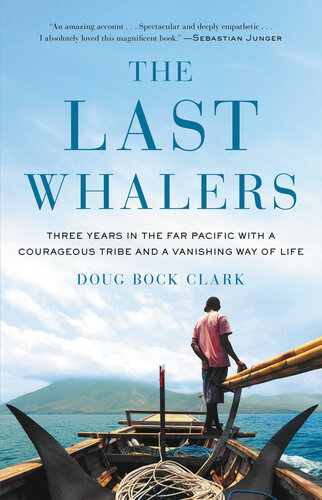
The Last Whalers
Three Years in the Far Pacific with a Courageous Tribe and a Vanishing Way of Life
کتاب های مرتبط
- اطلاعات
- نقد و بررسی
- دیدگاه کاربران
نقد و بررسی

October 8, 2018
In this fascinating debut, journalist Clark offers an account of a small hunter-gatherer society, the Lamalerans, devoted to whaling on the remote Indonesian island of Lembata. On his first visit to the Lamalerans’ village in 2011, Clark realized the Ways of the Ancestors—“a set of whaling and religious practices handed down through the generations”—still defined indigenous life there. Wondering how much longer these ancient traditions could last, Clark returned to Lembata several times in subsequent years, aiming to “immerse myself as deeply as possible in the tribe.” To that end, he hunted, wove ropes, spearfished, attended ceremonies, and bartered at the village market alongside the Lamalerans. With accessible and empathetic prose, Clark profiles the people he met there, such as Yonanes “Jon” Demon Hariona, a young man who aspires to become a “lamafa,” or harpooner, his society’s highest honor, yet also toys with the idea of seeking “a richer and easier life elsewhere,” away from his community. By exploring personal conflicts like Jon’s, Clark creates a thoughtful look at the precariousness of cultural values and the lure of modernization in the developing world. Agent: Jim Rutman, Sterling Lord Literistic.

October 15, 2018
Journalist Clark's carefully researched and often dramatic first book follows the residents of a small village on a remote Indonesian island as they engage in the tradition of hunting whales and adjust to the incursions of the outside world.Over the course of three years, the author, a two-time Fulbright recipient, spent months at a time on the island of Lembata with the Lamalerans, a group of hunter-gatherers. Of the 1,500 members of the tribe, 300 are dedicated to hunting sperm whales as well as other marine mammals and fish. Scrupulously leaving himself out of the narrative, Clark focuses on a few individuals to tell the story of the group. Chief among them are two young men who aspire to become harpoonists, the most prestigious--and dangerous--position on the whaling boat. Jon, raised by his grandparents after his parents abandoned him, struggles to find a place in a society that scorns him. Ben, an expert harpooner and boatmaker, finds himself drawn by the attractions of life outside the island. The author also closely follows Ben's father, Ignatius, and other older builders and masters of the long rowboats whose construction, unchanged for generations, is guided by the "Ways of the Ancestors." Clark pays less attention to the women of the group, many of whom are sent away to be educated and work elsewhere in Indonesia, sometimes returning to care for elderly family members, though he does devote space to the daily life of Jon's sister Ika, who wants to marry a young man from another tribe. In between the stories of the individuals, the author chronicles the history of the group and the ceremonies he attended in a society that meshes Catholic faith and animistic religion. Perhaps surprisingly, among the chief villains of the narrative are the World Wildlife Fund and the Nature Conservancy, which promote whale-watching rather than whale-killing. The author argues that sperm whales are less endangered than the Lamaleran society.An insightful examination of a little-known culture.
COPYRIGHT(2018) Kirkus Reviews, ALL RIGHTS RESERVED.

December 1, 2018
Hunting and gathering was the way of life for humans prior to the Agrarian Revolution in the Neolithic period. Today, there are few remaining subsistence cultures throughout the world. One such group endeavoring to cling to the ways of their ancestors is the Lamalerans of Indonesia, who serve as the focus of journalist Clark's debut. Over several years, Clark lived among the Lamalerans in an attempt to tell their story and, in a larger context, the human story. The result is a wonderful ethnography that comes alive through a novelistic approach in which Clark explains whale hunting culture and keys in on a few individuals and their families in his effort to inform readers about their lives, ultimately exemplifying how the juggernaut nature of the modern world impacts all of its inhabitants. VERDICT A thought-provoking study of a quickly disappearing society. Through this narrative even the most ardent protectors of whales or other endangered species can see the integral importance of whale hunting in this society and how the loss of it would irrevocably alter their culture.--Brian Renvall, Mesalands Community Coll., Tucumcari, NM
Copyright 2018 Library Journal, LLC Used with permission.

December 1, 2018
The subtitle sums it up nicely. Clark, a freelance journalist, spent three years living among the Lamalerans, a small Indonesian community that depends on ancient methods of whaling for its survival. It's a community being threatened from within (younger Lamalerans seek a more modern way of life, leaving the ancient ways behind) and from without (whaling is widely condemned in the modern world), but this is no dry sociological/environmental treatise. Instead, it's a gripping story of a community struggling for its very survival, and of the clash between ancient and modern worlds. Clark has a graceful, almost poetic writing style, and his vivid portrait of the Lamalerans and their way of life evokes in the reader a stirring image of a lost world, an ancient society that has somehow stayed virtually untouched by the march of time . . . until now.(Reprinted with permission of Booklist, copyright 2018, American Library Association.)

























دیدگاه کاربران